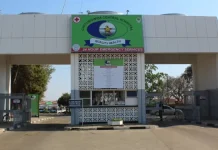A baby has tragically died in his mother’s arms while being breastfed in an Italian piazza where temperatures hit a scorching 44 degrees Celsius.
An autopsy has been scheduled to confirm whether the baby boy, named Roberto, died due to heat stroke in the Raffaele Piras Square, in Quartucciu, Cagliari, southern Sardinia on July 20.
Father Andrea Melis and mother Loredana, as well as the child’s unnamed grandparents, reportedly decided to get some fresh air at 10:30 pm.
While he was breastfeeding in Loredana’s arms, Roberto suddenly fell unconscious and the emergency services were tragically unable to save his life, according to local media.

Local prosecutor Andrea Vacca will determine if the baby died of heat stroke or if the cause of death was a congenital health issue.
Much of Southern Europe is currently gripped by a record-breaking heatwave and given that temperatures exceeded 44 degrees Celsius that day, doctors believe that the heat may be to blame for Roberto’s death.
Very young babies are often unable to regulate their body temperature like adults and are more susceptible to temperatures that can leave them either too hot or too cold.
Pietro Pisu, the Mayor of Quartucciu, said that the tragedy ‘has affected the population quite a lot’ as the investigation is ongoing.
Across the Mediterranean, heatwaves unofficially named after hellish Greek mythological figures pushed temperatures way beyond 40C and led to wildfires forcing the evacuation of thousands of people in Greece.
World Weather Attribution, a group of scientists from the UK and the Netherlands, said the heatwaves will get hotter and happen more frequently until the world stops burning fossil fuels.
Their rapid study found that without human-induced climate change, China’s heat would have been a one-in-250-year event, while the heatwaves in southern Europe would have been statistically almost impossible.
If the global average temperature rises to 2C above pre-industrial levels heatwaves will occur every two to five years, the scientists said.
Dr Friederike Otto of the Grantham Institute for Climate Change and the Environment, Imperial College London, said: ‘The result of this attribution study is not surprising.
‘The world hasn’t stopped burning fossil fuels, the climate continues to warm and heatwaves continue to become more extreme. It is that simple.
‘However, these heatwaves are not evidence of runaway warming or climate collapse. We still have time to secure a safe and healthy future, but we urgently need to stop burning fossil fuels and invest in decreasing vulnerability.
‘If we do not, tens of thousands of people will keep dying from heat-related causes each year.’












